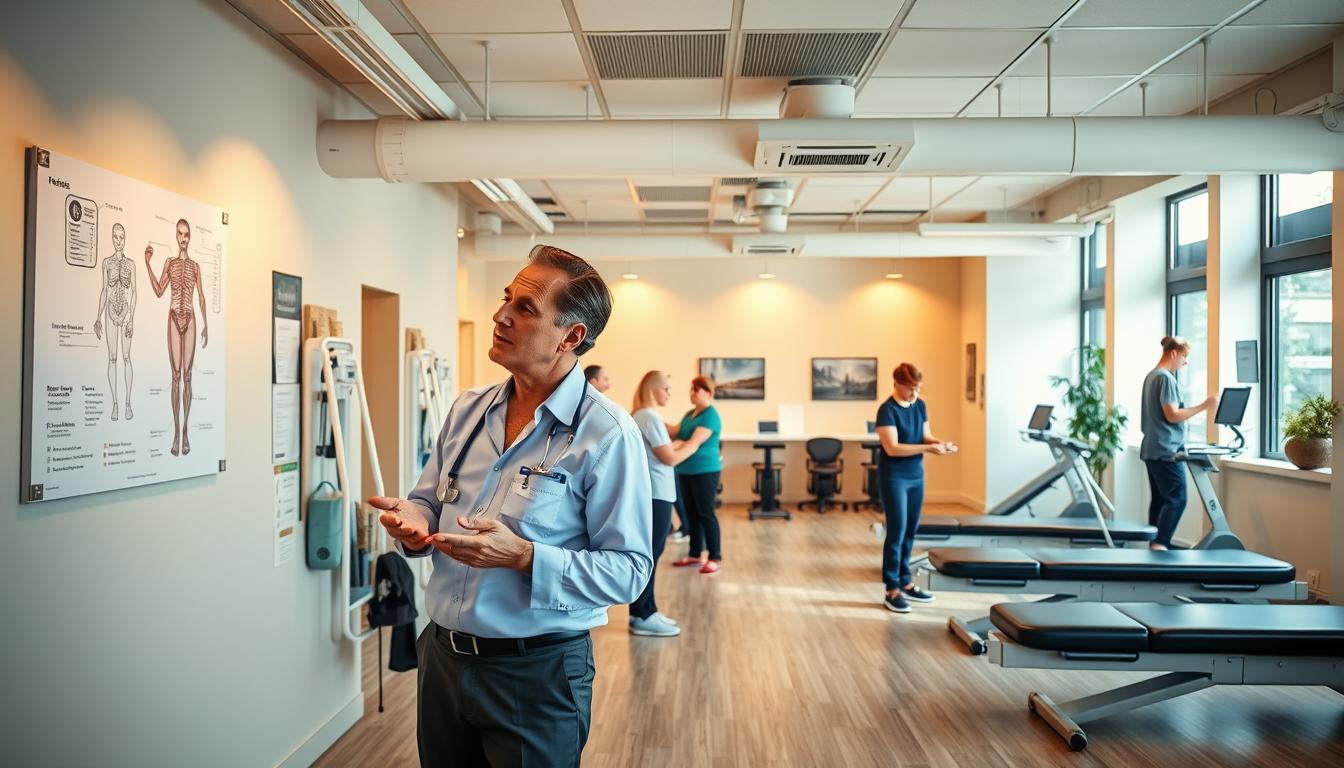Ever thought about how a good physical therapist can really change your recovery? The right PT can make a huge difference in your health journey. Whether you’re getting over an injury or dealing with a long-term condition, picking the right PT is key.
In this guide, we’ll show you how to pick a physical therapist wisely. We’ll cover the best ways to find a PT that fits your health goals. Knowing how to make this choice can help you improve your health and feel better.
Key Takeaways
- Choosing a qualified physical therapist is essential for effective rehabilitation.
- Evaluating a therapist’s expertise can impact your recovery timeline.
- Understanding your rehabilitation needs can guide your selection process.
- Researching credentials ensures you find a trustworthy PT specialist.
- Asking the right questions can clarify therapy approaches and expectations.
Understanding the Role of a Physical Therapist
A physical therapist is key in healthcare, focusing on movement disorders. They create plans to help patients move better. This is for people of all ages.
They teach patients about exercise and how to move right. This helps prevent injuries and keeps you healthy for longer. Learning from them is important for your health.
Physical therapists work in many places like hospitals and sports centers. Each place has its own challenges. Knowing where they work helps you choose the right one.
Understanding what a physical therapist does helps you see their value. They play a big part in your health care. Their work is key to your recovery.
Factors to Consider When Choosing a Physical Therapist
Choosing the right physical therapist is important. You should first look at their specialization. Different conditions need different skills. For instance, some therapists focus on sports injuries, while others work on post-surgical care or chronic pain.
Accessibility is also key. Think about the therapist’s location and hours. A therapist close to you with flexible hours makes it easier to attend sessions. This can improve your overall experience.
Look at the treatment techniques the therapist uses. Some might use manual therapy, while others focus on exercises. Knowing this helps you choose what fits your goals best.
Good communication is vital. You want a therapist who listens, explains things clearly, and values your input. This kind of relationship can really help you progress and feel better.
Lastly, choose a therapist based on reviews and recommendations. Online feedback or personal suggestions from others can show if a therapist is reliable and effective.
How to Choose a Physical Therapist
Finding the right physical therapist is key to your recovery. You need to know what you need and what the therapist can offer. This way, you can find the best fit for your treatment.
Identifying Your Rehabilitation Needs
First, figure out what you need help with. Think about what hurts and what you want to achieve. Ask yourself:
- What is your primary concern or injury?
- What goals do you wish to achieve through physical therapy?
- Do you have any previous experiences with physical therapy, and what did you find beneficial or challenging?
Knowing what you need helps you find a therapist who can help. This ensures your care is right for you.
Evaluating the Therapist’s Expertise
After knowing what you need, look at the therapists. Check their education, experience, and certifications. Look for:
| Criteria | What to Look For |
|---|---|
| Education | A degree from an accredited physical therapy program. |
| Experience | Years of practice and specific experience related to your condition. |
| Certifications | Relevant additional certifications or specializations held. |
| Patient Reviews | Feedback from previous patients about their experiences and outcomes. |
By looking closely at the therapist’s qualifications, you make a smart choice. This choice supports your health and recovery goals.
Steps to Choosing a Physical Therapist
Finding the right physical therapist is a big step. It means getting care that fits your needs. Start by looking at who you might choose, focusing on their skills and reputation.
Researching Qualifications and Credentials
First, check the education and certifications of possible therapists. Make sure they are licensed to work in your state. Also, look for certifications from known groups to show they’re experts.
Don’t just look at credentials. Think about their experience too. Therapists with special training in your area can help more. Read what others say about them to learn how they work.
Use the internet to compare different therapists. This can show if there have been any problems with them. Keep track of what you find to help make your choice easier.
| Criteria | Sources of Information | Importance |
|---|---|---|
| Licenses | State licensing boards | Confirms legal practice |
| Certifications | Professional organizations | Indicates specialized training |
| Patient Reviews | Online review platforms | Reflects patient satisfaction |
| Experience | Therapist’s website/LinkedIn | Demonstrates expertise in specific areas |
Physical Therapy Provider Comparison
When looking for a physical therapy provider, it’s key to compare their treatment methods and techniques. Each therapist uses different ways that can greatly affect your recovery. Knowing these differences helps you pick a provider that fits your recovery goals.
Assessing Treatment Approaches and Techniques
Physical therapy can include manual therapy, exercises, or advanced technology. It’s important to talk to each therapist about their methods. This way, you can see if they match your needs.
By looking at their approaches, you can understand how well they work for you. This helps you choose the right therapist for your condition.
| Provider | Treatment Approach | Techniques Used |
|---|---|---|
| Therapist A | Manual Therapy | Joint Mobilization, Soft Tissue Mobilization |
| Therapist B | Exercise-based Rehabilitation | Strength Training, Flexibility Exercises |
| Therapist C | Technological Aids | EMS, Biofeedback, Virtual Reality |
Comparing physical therapy providers carefully helps you find the right one for you. Think about the outcomes of each technique and your goals. This ensures you choose a provider who supports your recovery journey.
Finding a Qualified Physical Therapist in Your Area
Looking for a physical therapist? There are several ways to find one. Start by checking online review sites and physical therapy directories. They give you insights into therapists near you. You can also read what other patients have to say.
Talking to your doctor is another good idea. They can recommend therapists who fit your needs. Health facilities and hospitals also have lists of licensed therapists. This ensures you find a qualified one.
Being close to your therapist is important. It makes it easier to go to sessions without wasting time. Look at the physical therapy options in your area. Make sure they meet your needs. You can also call clinics directly to learn more about their services.
Important Questions to Ask a Physical Therapist
When looking for a physical therapist, it’s key to have a list of questions ready. These questions help you understand their qualifications and treatment approach. Start by asking about their experience, focusing on any conditions you might have.
Here are some key questions to ask a physical therapist:
- What is your experience with treating my specific condition?
- Can you explain your treatment philosophy?
- What types of therapies do you specialize in?
- How do you measure success in treatment?
- What should I expect during my therapy sessions?
These questions can clear up any doubts and help you understand the therapist’s methods. A detailed conversation will make you feel more at ease and confident in your choice.
Choosing the right physical therapist is all about asking the right questions. This way, you can make a decision that meets your rehabilitation needs and the therapist’s expertise.
| Question | Purpose |
|---|---|
| What is your experience with my specific condition? | To assess the therapist’s relevant experience. |
| Can you explain your treatment philosophy? | To understand their approach and values in therapy. |
| What types of therapies do you specialize in? | To determine if their skills align with your needs. |
| How do you measure success in treatment? | To gauge their effectiveness and tracking methods. |
| What should I expect during my therapy sessions? | To prepare you for the therapy experience. |
Evaluating Physical Therapy Clinics
When you’re looking for a physical therapy clinic, start by checking the place out. Look for a clean and welcoming space. This makes your therapy sessions more comfortable.
The staff’s friendliness and professionalism are also key. Notice how they treat you on your first visit. It sets the tone for your experience.
Think about how easy it is to get to the clinic. Is it close to your home or work? Does it have good parking? If you use public transport, check if it’s near a bus or train stop.
Also, look at the equipment they have. A clinic with modern tools usually offers better care.
Ask about insurance and scheduling. Make sure your insurance is accepted. Also, find out if they have appointments available when you need them. This helps you keep up with your treatment plan.
Lastly, think about the clinic’s vibe. Does it feel right to you? Is it comfortable? This is important for your recovery.
| Evaluation Criteria | Importance | Examples |
|---|---|---|
| Clinic Environment | Enhances comfort and is welcoming | Cleanliness, decor |
| Staff Friendliness | Improves patient experience | Staff interactions, responsiveness |
| Accessibility | Facilitates regular visits | Location, parking, public transport |
| Available Equipment | Supports treatment efficacy | Modern technology, variety of tools |
| Insurance Acceptance | Affects overall cost | Accepted plans, billing process |
| Appointment Availability | Ensures treatment consistency | Flexible schedules, prompt appointments |
| Overall Atmosphere | Aligns with personal comfort | Ambiance, client reviews |
Best Practices for Choosing a PT
Choosing the right physical therapist can be easier with some best practices. Start by researching therapists in your area. Look at their specialties and backgrounds. Also, ask friends, family, or healthcare professionals for recommendations.
Talking openly with a physical therapist is key. Share your goals, what you prefer, and what you expect. This will help you see if they’re a good fit for you.
It’s important to find a therapist with experience in your condition. Check their certifications and training. This way, you can find the best physical therapy for your needs.
| Criteria | Importance | Considerations |
|---|---|---|
| Research and Background | High | Check online reviews and testimonials |
| Personal Recommendations | Medium | Ask family or friends for insights |
| Open Communication | High | Ensure comfort in discussing concerns |
| Specialization | High | Focus on therapists with expertise in your area |
| Experience with Specific Conditions | Critical | Research their success rates with your specific issue |
Conclusion
Choosing the right physical therapist is key for your recovery and health. This guide has shown you important steps to make this choice. You’ve learned about your needs, the qualifications of therapists, and what clinics offer.
Think about what you need from a physical therapist. This helps you talk better with them. It lets them know how to help you reach your health goals.
By following these tips, you’ll find a great physical therapist. Take your time and ask the right questions. Your health is worth it, and you’ll feel confident in your choice.
FAQ
How do I know if a physical therapist is qualified?
To check if a physical therapist is qualified, look at their education and state license. Also, ask about their experience and any special skills they have. This will help match their abilities with your needs.
What questions should I ask when selecting a physical therapist?
When choosing a physical therapist, ask about their experience with your condition. Find out their treatment approach and how they track your progress. Knowing what to expect during sessions is also important.
Are there specific criteria I should consider when choosing a physical therapist?
Yes, consider their specialization and treatment methods. Their communication style and the clinic environment are also key. Make sure they align with your goals for effective therapy.
How can I find a qualified physical therapist in my area?
Look online or ask your doctor for recommendations. Check local health facilities too. Make sure to check their credentials and specialties to find the right fit for you.
What are the steps involved in evaluating physical therapy clinics?
When evaluating clinics, look at the environment and staff friendliness. Check if they accept your insurance and observe the atmosphere. Visiting the clinic can give you valuable insights.
What do I need to know about different treatment approaches offered by physical therapists?
Physical therapists use various methods like manual therapy and exercises. Research these and talk to them about your goals. This helps choose a method that fits your needs.
How important is effective communication with my physical therapist?
Good communication is key for a successful therapy. It ensures your therapist understands your needs and goals. This helps tailor a treatment plan just for you.
What are the best practices for selecting a physical therapist?
Best practices include researching and asking for recommendations. Interview several therapists and trust your instincts. Open discussions about your goals help make a good choice.
How can I evaluate a therapist’s experience with my specific condition?
To evaluate a therapist’s experience, ask about their past patients and outcomes. Request testimonials and discuss their treatment approach. This shows their expertise in your area.
How long should I expect my therapy sessions to last?
Therapy sessions usually last 30 minutes to an hour. Your therapist will decide based on your needs. This ensures you get the right amount of time for your rehabilitation.
James Foster, PT is a licensed physical therapist with over 11 years of hands-on experience in helping individuals improve mobility and live pain-free. As a health writer, James shares expert advice, rehabilitation strategies, and wellness tips to empower readers toward healthier, stronger lives.





